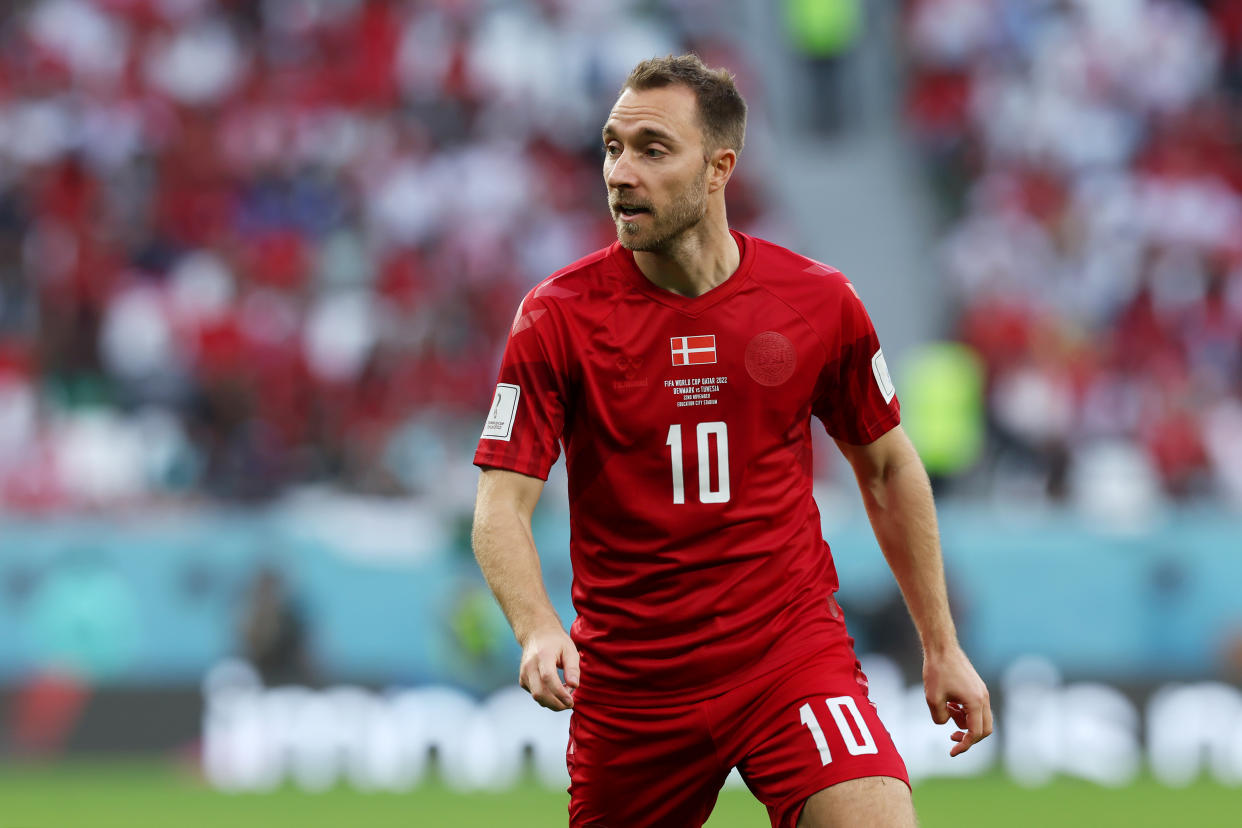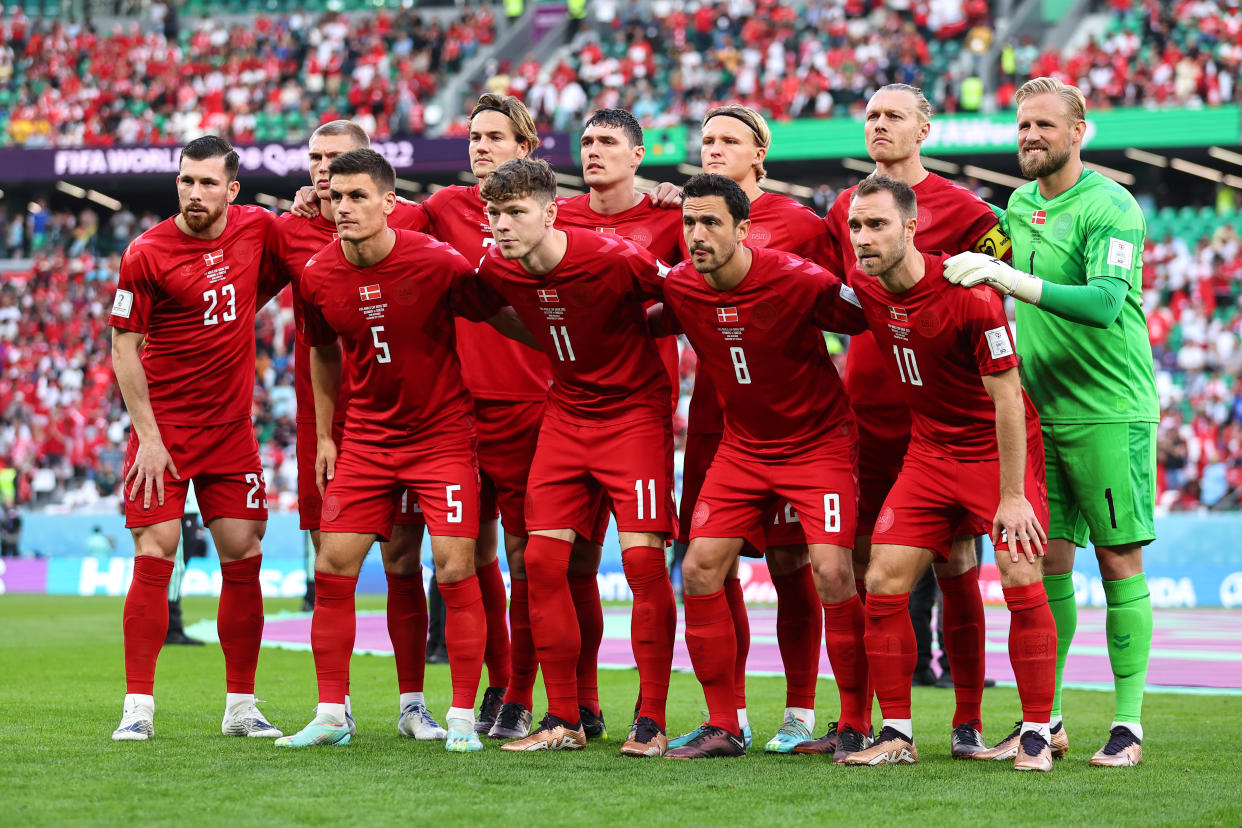World Cup 2022: Why Denmark’s ‘protest’ jerseys look like plain T-shirts
AL RAYYAN, Qatar — Denmark’s national soccer teams have spent the last six years outfitted by Hummel in distinctive jerseys with chevrons down their shoulders. But the Danish men showed up at the 2022 World Cup, and took the field here on Tuesday, in a kit that looks like a plain red shirt, and that doubles as a protest.
It features Denmark’s and Hummel’s logos, and the trademark chevrons, but all are “toned down” because, as Hummel said after releasing the kits, “We don’t wish to be visible during a tournament that has cost thousands of people their lives.”
Its statement was a reference to the disputed claim that working conditions in Qatar have contributed to the deaths of migrants who built World Cup-related infrastructure. Denmark’s all-black third kit, Hummel said, was the “color of mourning.”
The jerseys, Hummel said, were also “inspired by” the 1992 Denmark team that won the European championship. But the most notable aspect of their “dual message” was what Hummel called “a protest against Qatar and its human rights record.” In addition to its exploitation of migrant workers, Qatar has been criticized for its repression of free speech, its intolerance of homosexuality and its restrictions on women’s rights.
The jerseys, though, sparked accusations of performative marketing and hypocrisy. They are being manufactured in China, and Hummel will profit from them — and, by extension, indirectly, it will profit from the Qatar World Cup.
The Supreme Committee, Qatar’s World Cup organizing committee, responded shortly after the kit launched with a statement of its own, in which it “dispute[d] Hummel’s claim that this tournament has cost thousands of people their lives” and trumped reforms to Qatari labor law.
“We wholeheartedly reject the trivializing of our genuine commitment to protect the health and safety of the 30,000 workers who built FIFA World Cup stadiums and other tournament projects,” the Supreme Committee said in its statement.
Denmark’s soccer federation, the DBU, did not mention the protest in its announcement of the kits. It, instead, focused on “the 30th anniversary of the greatest triumph in Danish football,” the 1992 Euros. Hummel has said that the “kit has been created in close collaboration with DBU.” But it seems that the century-old sportswear company — which is headquartered in Denmark, and does not outfit any other 2022 World Cup teams — is the primary voice behind what have become known as the “protest jerseys.”
“We support the Danish national team all the way,” Hummel said in its statement. “But that isn’t the same as supporting Qatar as a host nation.”

Qatar: Migrant deaths not out of proportion to population
Hummel’s claim about “thousands of lives” — which echoes many similar allegations from Western fans and media — stems, apparently, from misleading and misinterpreted media reports.
The central claim in the most consequential report, a 2021 Guardian article whose headline and deck were amended a week after publication, was this: “More than 6,500 migrant workers from India, Pakistan, Nepal, Bangladesh and Sri Lanka have died in Qatar since it won the right to host the World Cup 10 years ago.” (The article later noted that there were 37 deaths "directly linked to construction of World Cup stadiums.")
None of that is disputed. In fact, according to Qatari government figures, over 17,000 migrants of all nationalities have died in Qatar since 2010.
What’s disputed is how many of those 17,000-plus deaths were connected to the World Cup, how many were products of unsafe working conditions, and whether 17,000 deaths in a population of roughly 2 million, over a span of 11 years, is at all abnormal.
According to Qatari government statistics, less than half of the country’s migrants work in construction; 68% are considered "unskilled" or "limited skill." Only a fraction of them have been employed at World Cup sites. The Supreme Committee says that there have been three fatal accidents at those sites; and three dozen other workers have died while employed at them. Critics, though, argue that the vast majority of infrastructure in Qatar that’s risen over the past decade has been built to serve the World Cup; and that the human cost of the tournament should factor in those deaths.
The Qatari government, on the other hand, has argued that the thousands of deaths fall in line with expectations based on population-wide mortality rates. That claim has been neither independently confirmed nor definitively refuted.
The real problem, experts say, is that over half of the deaths in question are effectively unexplained. “That,” said Nick McGeehan, an investigator and worker rights advocate at FairSquare, “is the scandal.”

'Our vision to change the world through sport'
The focus on deaths, some advocates believe, has distracted from indisputable violations of migrant rights in Qatar. And it certainly made Denmark’s kits more polarizing.
The international debate surrounding the jerseys compelled Hummel to publish an FAQ on its website to address some criticism. In response to a question about Qatar’s pushback, Hummel said: “The most important thing for us is that human rights have been abused with regards to migrant workers in Qatar.”
It acknowledged that China, the site of “a large part” of Hummel’s production, is “a high-risk country with regards to human rights.” But it said that it conducts regular audits of suppliers, and that it has a Hummel employee “permanently located” at the factory where the Denmark jerseys are being made.
It also rebutted the accusation that the jersey was a stunt. “It isn’t a commercial decision to articulate our opinion regarding the World Cup in Qatar,” Hummel wrote. “It is instead about our vision to change the world through sport.”
The company has said it is collaborating with Amnesty International, a human rights organization that has regularly investigated and criticized Qatar. Hummel promised in the FAQ that “a percentage” of jersey sales would be donated to Amnesty. The company’s owner separately said that 1% of revenue from all online sales will go to Amnesty.
Hummel also addressed the divide in messaging between itself and the DBU, and the Danish federation’s apparent “backpedaling.”
“Both parties have agreed on the direction and statement of the jerseys,” Hummel wrote. “The black third jersey in particular — regardless of choice of words or language — is intended as a pause for thought and time for reflection on the importance of human rights and compliance with them.
“The use of the word ‘mourning’ is also Hummel’s own wording,” the company clarified, “but apart from that, there is no disagreement between Hummel and DBU in relation to the statement and communication.”
